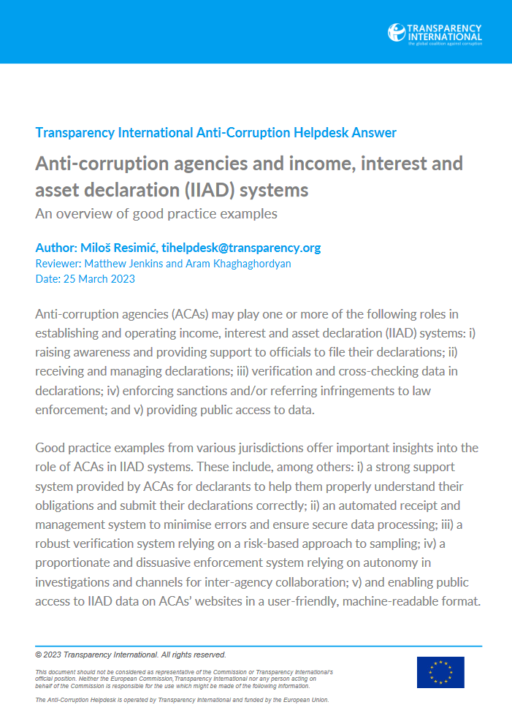- Home
- Anti-Corruption Helpdesk
- Anti-corruption agencies and income, interest and asset declaration (IIAD) systems
Anti-corruption agencies and income, interest and asset declaration (IIAD) systems

This Anti-Corruption Helpdesk brief was produced in response to a query from one of Transparency International’s national chapters. The Anti-Corruption Helpdesk is operated by Transparency International and funded by the European Union.
Query
Please provide an overview of “good practice” examples of national anti-corruption agencies/commissions around the world that are involved in overseeing and enforcing asset declarations/financial disclosure by public officials.
Summary
Anti-corruption agencies (ACAs) may play one or more of the following roles in establishing and operating income, interest and asset declaration (IIAD) systems: i) raising awareness and providing support to officials to file their declarations; ii) receiving and managing declarations; iii) verification and cross-checking data in declarations; iv) enforcing sanctions and/or referring infringements to law enforcement; and v) providing public access to data.
Good practice examples from various jurisdictions offer important insights into the role of ACAs in IIAD systems. These include, among others: i) a strong support system provided by ACAs for declarants to help them properly understand their obligations and submit their declarations correctly; ii) an automated receipt and management system to minimise errors and ensure secure data processing; iii) a robust verification system relying on a risk-based approach to sampling; iv) a proportionate and dissuasive enforcement system relying on autonomy in investigations and channels for inter-agency collaboration; v) and enabling public access to IIAD data on ACAs’ websites in a user-friendly, machine-readable format.
The Arabic version of this Helpdesk Answer is available here.
Main points
- ACAs around the world rely on various tools, including radio announcements, emails, call centre support, instructional videos and manuals to support officials to file declarations.
- ACAs can utilise customised software to minimise errors during submission and ensure secure data processing.
- To improve the efficiency of verification, ACAs can rely on a targeted, risk-based sampling techniques to ensure that declarations that are red flagged against predefined risk indicators are subject to closer inspection.
- Stronger autonomy in investigations, as well as inter-agency collaboration, is important for effective enforcement, along with a variety of dissuasive and proportionate sanctions.
- ACAs have a role in providing public access to IIAD data in a user-friendly and machine-readable format.
Content
- Introduction
- The basic principles of effective IIAD systems
- The role of ACAs in establishing and implementing IIAD systems
- awareness raising and support to officials to file their declarations
- receipt and management of declarations
- verification and cross-checking of data in declarations
- enforcement of sanctions/referral to law enforcement
- providing public access to data
- ACAs and IIAD systems: good practice examples
- References
Authors
Miloš Resimić, [email protected]
Reviewers
Matthew Jenkins and Aram Khaghaghordyan
Date
03/04/2023
Tags
 Download PDF
Download PDF
